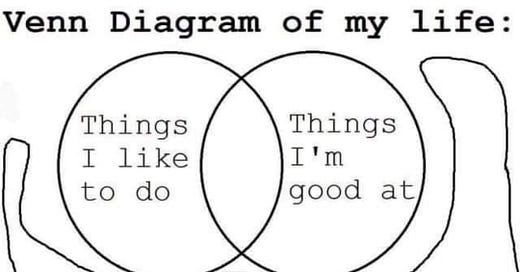“Follow your passion” is a well worn cliche.
I think that this advice gets at something important, but is phrasing it badly. The truth it gets at is that we should work with our internal motivational system rather than against it.
Instead of passion, we can focus on interestingness. Interestingness is not a guarantee of wholesomeness or meaning. But it does align with a high degree of motivation. Things are easier to do when they’re interesting.
When I was doing my undergraduate and gunning for law school, I wanted a very high GPA. So I only took courses that looked interesting. This worked very well.
In law school I crashed because this approach did not work as well anymore. I tried to follow a careerist script. I failed to find what was interesting to me in the study of law.
I was trying to willpower my way through an unfamiliar script of careerist climbing in a zero sum environment among people who were very interested in careerist climbing.
What is this thing called interestingness?
“Interesting” in its widest sense is anything that easily attracts or compels rapt, focused attention.
By this definition video games, pornography, VLTs, or social media are interesting to a lot of people. This is a valid definition of interesting, but it’s a bit too broad for my purposes. So I will propose a narrower definition.
Things are interesting when:
They provoke a rapt, focused attention;
they do not have an obvious, intuitive payoff;
that rapt, focused attention leads to a detailed level of knowledge.
Interestingness has an aura of uselessness, but it doesn’t have to. The catch is not that we can’t be interested in things that are genuinely useful - but that we are interested in them independent of their usefulness.
Consider “car guys.” Knowing about cars can be really useful. But for car guys, the appreciation goes deeper than just a knowledge of how to keep their car working smoothly - they are fascinated with them and enjoy learning, thinking and talking about well beyond solving and preventing problems. This interest produces a level of knowledge and expertise that a merely utilitarian car user lacks.
Nerds and Geeks
Some people are intensely interested in things that are optimized for being interesting - such as fictional worlds that have a drama and intensity not normally found in daily life. I’ll call these people geeks.
Someone with an extensive, instantly recallable knowledge of Lord of the Rings or Star Trek canon is a geek. Highly knowledgeable sports fans are also geeks.
Someone who has this interest in something that has NOT been optimized for this kind of interestingness is a nerd. Someone obsessed with beetle taxonomy or trains is a nerd.
Nerds are more likely to acquire useful and exploitable knowledge than geeks. At the very least, nerds are more likely to produce knowledge the contributes to a conceptual map of the external world. A better map is useful even though it is impossible to say what detail or feature of that map - if any - is going to be useful.
Tolkien was a nerd. He developed a deep knowledge of germanic mythology and linguistics because it was interesting to him. In contrast, someone with an exhaustive knowledge of his fictional works is a geek.
Interestingness is a River
Interestingness is not a road or a path - these things are built with ends in mind. They go towards specific destinations.
Interestingness is more like a river. A river is a naturally occurring feature. It winds its way towards some other body of water. It follows the lay of the land, not a destination chosen for it.
Rivers are incredibly exploitable. They are game changers for travel and navigability. You don’t choose the end towards which a river flows - but many worthwhile and exploitable things have been built along the river *because the river was there.*
“Follow your passion” vs “Exploit your interests”
When you are doing things that are interesting, you are doing them without the internal resistance that comes from doing things that are boring. The more you are interested in something, the easier it becomes.
This isn’t inherently a good thing. Maybe you *should* be filing your taxes instead of learning Sonic the Hedgehog lore.
But chances are at least *some* of your interests are either wholesome or exploitable - that is to say, they can occupy the niche where your preferences and meta-preferences line up - where what you want is what you want to want.
Exploitation and “Selling Out”
There was a time when bands were regularly accused of “selling out.” What had become someone’s passion project devolved into a business that produced bland, commercially viable music.
This led to a backlash in the form of obscuro-supremacy - anything well known or commercially successful by definition could not be good.
This is wrong. There is a positive sum and a zero sum way of presenting your interests to a larger audience. The positive sum way is that you highlight and emphasize the things likely to be interesting to others - without compromising what is interesting to you.
The zero sum way is that you make the Lite(TM) version that is dull and supposedly inoffensive to the masses.
Being Interesting is not Interesting
Trying to be interesting is one of the least interesting things you could possibly do.
Being interesting is a side effect of being interested. The more time you spend on things that interest you, the more *likely* you are to become an interesting person.
If you are trying to game social dynamics for utilitarian reasons chances are you aren’t interested. If you’re reading guides on “How to Be Interesting” you’ve already lost.
There isn’t a guarantee that your interests will make you interesting. But that isn’t the point of what is interesting. Something (or someone) who optimizes for being interesting to *everyone* ends up being interesting to no one. Anyone or anything that tries to be interesting to everyone produces the bland uniformity of slop.
The amateur mycology obsessive will strike out in many social situations. He doesn’t care. He’s in the forest looking for mushrooms. And if he finds someone who loves mushrooms the way he does he will open up to them like a long lost friend. And yes, he does have a more interesting life than most people.
People who optimize for being interesting rarely are. Optimizing for being interesting is inherently dull - it produces a rapid succession of novelty traits and stories to be put on display to convince others of ones interestingness.
People sometimes confuse novelty and interestingness. Novelty can be a hint of a previously unknown depth in the world - one that demands exploration. But it is entirely possible to have novelty without interestingness. Generating shallow, trivial novelty is quite easy.

Methods of Exploitation
Exploitation is any way that you use your interests to pay off in some other domain. The payoff can be for you or someone else. If your interest leads you to produce an innovation that benefits others, that is still exploitation even if you personally benefit very little from it.
Hitching
Hitching in this case is just using the motivational power of something interesting to take you towards another goal. It is what I did to get into law school. By choosing a major and courses in topics that interested me, I could secure a very high GPA that guaranteed acceptance.
Domain Expert
This is the “car guy” who becomes a mechanic. His interest translates to knowledge, which allows him to help others and get paid. For an obviously practical interest, the path to exploitation is straightforward.
A less practical example is an academic who specializes in ancient Sumerian. Having people studying the past is good, and there are jobs doing this, but they are fewer and more competitive. It is harder but still possible to contribute to human knowledge and make a living with such a niche interest.
I think many domain experts are very interested nerds, but probably not all. I suspect some domain experts stumble into a domain, find it reasonably enjoyable, and end up doing it until they have acquired a fine expertise.
Missionary/Artist
The missionary or artist is trying to create or impart what he feels is interesting about something to a broader audience.
This works because lots of people have an interest in something that may not be as consuming as yours. There are lots of people who lack the motivation to be good musicians but want to hear music by people who are. There are people who might not be interested enough in American civil war history to write a book about it, but are interested enough to read one.
Innovator/Entrepreneur
This is when you directly apply your domain knowledge to a real world problem in a way that other people are not doing.
The first wave of home computing entrepreneurs - people like Bill Gates and Steve Jobs - were interested enough in computers to acquire a high degree of knowledge and expertise (and to advance the field) - and saw that this new technology could have real world applications that other people were not exploiting.
Social Facilitator/Supporter
This is the role for people who are interested in a thing but perhaps not enough to acquire a high degree of technical knowledge about it. It is especially helpful for people who are extroverted and socially competent and have a strong interest in something.
This is not the person who plays in the band, but the one who organizes the show. They might not write books, but they will organize salons.
Good podcasters do this. Ideally a podcast combines an interested non expert host with a high level domain expert. The job of the host is to play the role of an interested audience standin - asking intelligent, probing non-expert questions.
Conclusion
Interest, like belief or desire, is not completely voluntary. We don’t choose what we believe or what we are interested in.
But we can direct our attention towards some interests instead of others. We can choose wholesome or exploitable interests over unwholesome or non-exploitable ones. We do have some moral obligation to cultivate our interests, choosing things more likely to make our lives and those around us richer.
The take away from this, much like in my other post “Self Discipline for Screwups” - is that we can get further by working with our motivations than against them. Life is not just a weary duty. It can be both interesting and wholesome.












This article hit home with me. Never being able to "find my passion" was stressful career-wise. But I found an occupation that has held my interest and I like my job. Throughout my life, I've found topics and hobbies that intensely interested me (still do!) and often novelty was a part of it, like when I lived abroad. I also found my fellow expats to be interesting people - stemming from your quote, "Being interesting is a side effect of being interested. The more time you spend on things that interest you, the more *likely* you are to become an interesting person."
Your definition of geeks and nerds was helpful because I thought they were synonyms, but I see the difference now. I look forward to reading more of your posts, I just subscribed.
your posts on motivation continue to be excellent and inspiring. thank you for your work